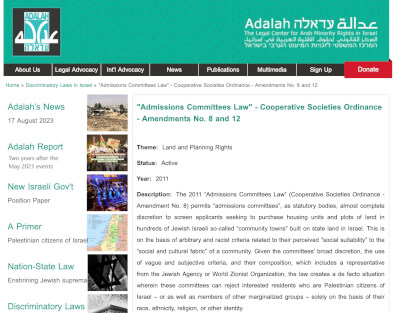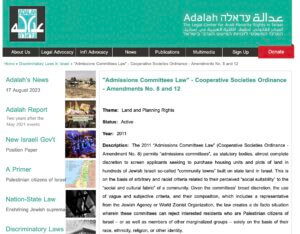Civil Society Organizations to the Israeli Supreme Court: Cancel the Racist Admissions Committees Law
A petition by Adalah on behalf of nine organizations argues that a recent amendment to the law, aimed at ‘strengthening Jewish settlement,’ underscores its discriminatory purpose towards Palestinian citizens and will harm marginalized communities. 21 September 2023
Today, 21 September 2023, nine civil society organizations filed a petition to the Supreme Court challenging the “Admission Committees Law”, following its recent amendment, approved by the Knesset in July 2023 (Amendment No. 12).
The petitioning organizations are Adalah – The Legal Center for Arab Minority Rights in Israel, The Association for Civil Rights in Israel, The Arab Center for Alternative Planning, The Mizrahi Democratic Rainbow Coalition, Bimkom – Planners for Planning Rights, Ahoti – for Women in Israel, The Association for Distributive Justice, Gila Project for Trans Empowerment and Tolerance, and the Association of Ethiopian Jews.
The petitioners demanded the nullification of the 2023 amendment to the law, titled the Cooperative Societies Ordinance, as well as the annulment of original law passed in 2011. HCJ 7148/23 Adalah, et al. v. The Knesset, et al.
CLICK HERE to read the petition [Hebrew] CLICK HERE to read more about the law and the petitions challenging it in the Discriminatory Laws Database.
The 2011 law grants bodies known as “admissions committees” almost complete discretion to screen applicants for housing units and plots of land in hundreds of Jewish Israeli “community towns” built on vast swathes of state land, based on arbitrary and racist criteria related to their perceived “social suitability” to the “social and cultural fabric” of a community.
The law was introduced to circumvent the landmark Supreme Court decision in the Qa’adan case, which prohibited Jewish towns established on state land from preventing Palestinian citizens from residing in them. In 2014, the Supreme Court rejected petitions filed against the law, determining that the law was premature for constitutional review at the time. On 25 July 2023, the Israeli Knesset passed Amendment No. 12, which effectively removed restrictions on the maximum number of households that “community towns” may have and be permitted to operate an admissions committee, and so expanded the applicability of these exclusionary bodies.
The amendment to the Cooperative Societies Ordinance currently applies to 437 localities, which is more than 41% of all localities in Israel, and allows the operation of admissions committees in all regional councils, covering approximately 80% of the state’s territory.
In the petition, the organizations argue that the initiative to expand the scope of the law stems from the fact that the original law successfully fulfilled its main, racist purpose: to gate-keep segregated Jewish towns throughout Israel and prevent Palestinian citizens from residing in them. Members of the Knesset who initiated the 2023 amendment made their motives clear in explicit statements during Knesset deliberations on the law. The petitioners argue that the Supreme Court can no longer overlook the discriminatory intent of the law and the resulting violation of the constitutional right to equality of Palestinian citizens and members of other marginalized groups.
The 2023 amendment expands the law in several key areas:
Expanding the Scope to Larger “Community Towns”
The amendment effectively removed restrictions on the maximum number of households that “community towns” may have and be permitted to operate an admissions committee. Previously, these smaller towns with up to 400 households were allowed to operate admission committees. The new law introduces a new category of “continued community town,” defined as having 400-700 households, which are permitted to run an admissions committee, subject to the approval of a special committee. Furthermore, the law stipulates that in 2028, the Minister of Economy and Industry will be authorized to grant permission for admissions committees to screen applicants for housing plots in towns with over 700 households. The new amendment therefore greatly expands the sphere in which admissions committees may operate.
Geographic Expansion
Jewish towns where admissions committees can operate will no longer be limited to the Naqab and the Galilee areas in Israel, as was the case prior to the new amendment. Instead, any towns listed on the Ministry of Construction and Housing’s national priority map that fall within clusters 1-5 of the socio-economic peripheral index of the Central Bureau of Statistics, will be permitted to operate admission committees. While the proposed law initially suggested expanding its geographical scope to include Israeli Jewish settlements in the Occupied West Bank, such a provision was ultimately deleted from the final version of the enacted law. However, it is expected that the provisions of the law will be implemented in settlements in the West Bank via military orders.
Introducing a New Vague Basis for Rejecting Applicants
The law has introduced an additional vague criterion for declining applicants wishing to reside in so-called “continuous community towns” (with up to 700 households), allowing for rejection based on the applicant’s “lack of suitability” to the town’s “public communal characteristics”.
The Purpose of the 2023 Amendment
During Knesset deliberations leading up to the 2023 amendment of the law, the racist intention behind the legislation became blatantly evident. On 20 July 2023, during a session of the Knesset Committee on Public Projects, Member of Knesset Matan Kahana stated that, “We are here engaged in strengthening the Jewish settlement in the Galilee and the periphery. […] and we need to proclaim it loudly…”. Likud MK Avihai Boaron further emphasized that, “We must challenge the Supreme Court and present to it the argument that in the balance between Jewish and democratic values, we are tipping the scale here, in this specific instance, towards the Jewish side, in the name of Israel’s overall interests and the comprehensive vision of the Jewish people.” A representative of the Shin Bet (“Shabak”) who participated in the Knesset committee’s discussion explained that the issue the bill aims to promote, “pertains to broader national security dimensions,” and that the Shin Bet’s working assumption is that, “establishing a physical presence in the region through settlement serves as a fundamental element in attaining sovereignty and governance in the territory.”
The petition, filed by Adalah’s Legal Director Dr. Suhad Bishara, argues that the amendment, along with the explicit statements made by Members of Knesset during the legislative process, makes it abundantly clear that the law has a racist purpose, namely, promoting segregation and Judaization. The petitioners also argue that the law violates Israeli constitutional law, an argument that is consistent with the minority opinion in the 2014 ruling on the law, in which four justices held that the law was unconstitutional, in whole or in part, due to its disproportionate violation of the rights to equality, dignity, and privacy. The petition further cited an expert opinion by the Israeli Law Professors’ Forum for Democracy, which noted that the amendment “creates a vast space closed off to most of the Israeli population, effectively controlled by a small and privileged group of the country’s citizens”.
The petitioners stressed that, in accordance with public law, the allocation of public land must adhere to the principles of equality and distributive justice. Thus, every citizen, irrespective of their national belonging, ethnic background, religious affiliation, physical or mental abilities, financial situation, educational background, criminal record, profession, sexual orientation, gender identity, or political opinions have the the unequivocal right to reside in any city, town, or village situated on state land within the State of Israel. The petitioners thus argue that no entity has the authority to restrict individuals’ fundamental right to select their place of residence based on personal characteristics or nationality. Furthermore, admission criteria, such as assessing an individual’s suitability for “social life in the community,” “social-cultural fabric of the community,” or “public communal characteristics,” are racist, deliberately vague and open to abuse, and serve an illegitimate purpose.
Adalah’s Legal Director Dr. Suhad Bishara commented:
“The Knesset and the government persist in entrenching a discriminatory land policy that runs counter to fundamental principles of international law. The architects of this law do not conceal their aim to expand and deepen racial segregation and promote Jewish supremacy. Under this law, admission committees wield authority, allowing a privileged few to determine access to land resources, all in the pursuit of institutionalized discrimination based on nationality. This violates the rights of various marginalized populations, including Palestinian citizens.”


- Israelisnipers shooting and killing hospital workers in Gaza - December 11, 2023
- CAIR Condemns Israeli Executions of Wounded, Unarmed Palestinian in West Bank - December 11, 2023
- Arab and Muslim American voters face a “simple choice” between Biden’s inhumanity and Trump’s edgy politics - December 9, 2023

























Comment on “Civil Society Organizations to the Israeli Supreme Court: Cancel the Racist Admissions Committees Law”